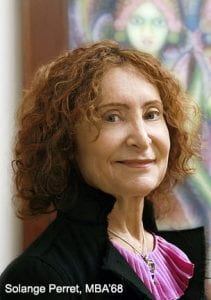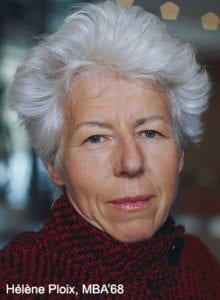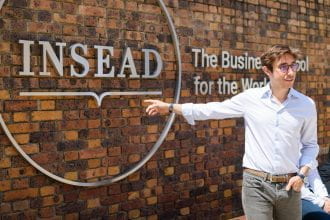The first two women ever to earn an INSEAD MBA recall how the school shaped their success
This year, 330 women will graduate with an INSEAD degree, one of the highest representations among all top management schools. They join more than 7,000 INSEAD alumnae who are leading companies, creating businesses and influencing communities and nations everywhere.
The school continues to live up to its founding values of diversity by promoting opportunities for women, including through scholarships and efforts such as Women@INSEAD, an initiative whose global network and knowledge is helping advance a more equitable, innovative business world.
 But more than 40 years ago, when Hélène Ploix and Solange Perret, both MBA’68 became the very first female students at INSEAD, women had not yet ascended the corporate ranks, and they were still a decided minority within business schools. Both young scholars, though, were seeking to excel and transcend conventional expectations. To do so, they turned to INSEAD to provide an education that would expand their horizons—figuratively and literally.
But more than 40 years ago, when Hélène Ploix and Solange Perret, both MBA’68 became the very first female students at INSEAD, women had not yet ascended the corporate ranks, and they were still a decided minority within business schools. Both young scholars, though, were seeking to excel and transcend conventional expectations. To do so, they turned to INSEAD to provide an education that would expand their horizons—figuratively and literally.
“I wanted to study business and the international environment was hugely attractive, so INSEAD was an obvious choice for me,” says Perret, a French native and co-founder of London Perret Roche Group, the management consultancy that she and her spouse, Peter, launched in 1985.
Even before enrolling at INSEAD, Perret had indulged her desire to see more of the world: As a high school student learning Russian, she was selected for a two-month exchange programme in the Soviet Union. Soon after, she spent a year living and learning with an American family in California.
It was her INSEAD education, though, that sparked Perret’s diverse career, which has included roles as corporate executive and global consultant. To these, she added the role of professor, after she earned her doctorate in Business Administration from the University of Western Ontario. Perret recently began a book project called “Working with Passion,” aimed at “reigniting workplace passion” and inspiring collaborative and creative business environments. This project draws from her extensive experience as a consultant and scholar, including insights from what she calls her “proudest moment”: collaborating with the top executives of Johnson & Johnson for more than a year, “helping them expand their mindsets and design new paradigms” for business innovation.
Similarly, Hélène Ploix’s remarkable career in the world of finance began with her INSEAD MBA, an experience she praises as a “comprehensive framework” and credits as the “springboard” for her professional success. In particular, INSEAD helped her achieve an early professional goal of joining McKinsey & Co. in Paris. That opportunity, she says, opened the door to many others.
“In those days, women had to be persistent without being aggressive,” says Ploix, who today oversees €400 million in investments as Managing Director and Chairman of Pechel Industries Partenaires and Pechel Industries SCR, an independent mid-market private equity firm. “My experience at McKinsey, which would not have been possible without INSEAD, was decisive.”
 Prior to Pechel, which she joined in 1997, Ploix was Deputy Managing Director at Caisse des des Dépôts et Consignations (CDC), a state-owned financial institution, in charge of finance and banking, as well as serving as Chair of CDC Participations, managing €1.5 billion, including €600 million in private equity. She also has served as Executive Director of the International Monetary Fund and The World Bank and on numerous boards. In addition, she was financial advisor to Laurent Fabius during his tenure as Prime Minister of France.
Prior to Pechel, which she joined in 1997, Ploix was Deputy Managing Director at Caisse des des Dépôts et Consignations (CDC), a state-owned financial institution, in charge of finance and banking, as well as serving as Chair of CDC Participations, managing €1.5 billion, including €600 million in private equity. She also has served as Executive Director of the International Monetary Fund and The World Bank and on numerous boards. In addition, she was financial advisor to Laurent Fabius during his tenure as Prime Minister of France.
For Ploix and Perret, being the only two female students at INSEAD in 1968 challenged them to develop the confidence and skill to present their ideas strongly, even when “outnumbered” by their male counterparts. Ploix says that she learned to be her authentic self, rather than trying to put forward an idealised public image. “In those days, just as today, one had to strive to acquire a job,” she says. “To be successful, anyone—man or woman—must act genuinely and by using good judgement.”
Perret, too, at INSEAD began a professional journey that today is focused on passion and authenticity. “Stand up for yourself,” she advises young women. “Speak your mind; you have something to say. This is not about being aggressive, but confident. Although we are in 2014, business is still largely a white, male-dominated world. This is no time to be self-effacing or a ‘shrinking violet.”
Beyond the ‘glass ceiling’
The advancement of women in modern professional life was prompted thanks to several connected factors. The details vary by country, but the social transformation generally dates back to World War II when labour shortages—the result of men heading off to battle—required dramatic increases in the female workforce. Then, too, the rise of women’s liberation movements, combined with increased access to higher education, resulted in more women pursuing careers outside the home, a trend that subsequently was reinforced by growing economic necessity.
Still, in many companies and on many Boards, women continue to be underrepresented today. One reason, says INSEAD leadership expert Herminia Ibarra, is that subtle forms of gender bias persist in organisations, even if progressive thought and policy has banished the more obvious prejudices against women executives. Ibarra, a distinguished scholar and the winner of the 2013 “Thinkers50 Leadership Award,” has identified what she calls the “second-generation bias.” These less deliberate forms of exclusion can arise from cultural assumptions and organisational structures that inadvertently benefit men at the expense of women.
“This bias shows up in various ways,” says Ibarra. “It can manifest through a lack of appropriate role models for women leaders. It can stem from entrenched ‘gendered’ career paths and work or due to a lack of access to networking opportunities or sponsors. Then there also are well-established cultural notions that link masculinity and leadership—particularly leadership styles that are decisive, assertive and independent.”
All of these factors can work against women seeking greater professional success. One strategy to help remedy these biases, says Ibarra, is to educate more people—men and women—about the existence of the prejudice. Doing so can help create healthier, more equitable and more successful workplaces.
INSEAD continues to champion the ideals of diversity, including by enabling more women to advance as organisational leaders. For example, the school’s Women@INSEAD initiative, directed by Ibarra, produces high-impact gender research. It also provides resources and a global community that supports women’s professional ambitions.
In addition, the new INSEAD Endowed Scholarship for Women provides merit-based financial support to a deserving female MBA student each year. Though women account for more than 30% of INSEAD’s current enrolment, the school aims to create an even balance of students. The scholarship is one important tool for achieving these results and for increasing the school’s high-quality, diverse learning environment. A campaign for the scholarship is now underway, with a target of raising at least €250,000 by August 31, 2014, to bestow the inaugural scholarship in September 2015.
Alumnae such as Perret and Ploix are living examples of the power of an INSEAD education. What’s more, they exemplify the ideals that have animated INSEAD for more than a half-century. Entrepreneurial and bold, each of these women continues to create value and opportunities that build stronger organisations and greater prosperity.
“Work with passion,” says Perret. “Look for what you want to contribute, not just what you want for yourself. If you make your contribution, what you want for yourself will follow too, and you will be much happier.”
Find out more about the INSEAD Endowed Scholarship for Women.
Here’s how you can help:
- Make a gift and support the campaign!
- Know of a woman who should be in the MBA programme? Let us know!
Contact mba.info@insead.edu


